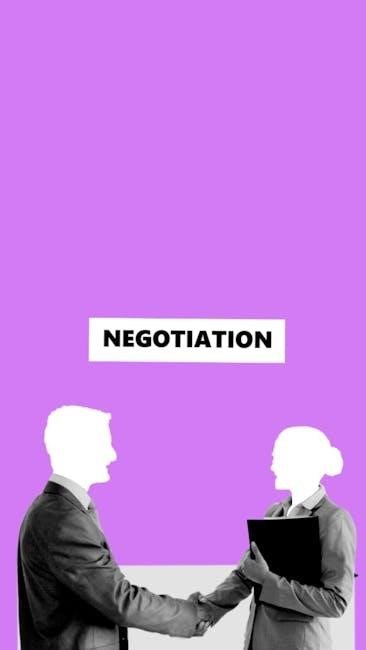
the art of the deal summary pdf
“The Art of the Deal” by Donald Trump is an autobiographical account of his business strategies, real estate triumphs, and Machiavellian mindset, offering universal lessons for success.
Overview of “The Art of the Deal”
“The Art of the Deal” is a memoir and business guide by Donald Trump, blending personal anecdotes with practical advice on negotiation and deal-making. Published in 1987, the book captures Trump’s business philosophy, emphasizing the importance of thinking big, confidence, and intestinal fortitude. It recounts his early life, career milestones, and real estate triumphs, offering insights into his approach to risk and failure. The book also explores psychological strategies for understanding opponents and leveraging power in negotiations. While focused on Trump’s experiences, the principles outlined are broadly applicable, making it a influential read for anyone interested in business, leadership, or personal success. Its enduring popularity reflects its relevance in both corporate and everyday contexts.
Key Themes and Takeaways
“The Art of the Deal” emphasizes several core themes, including the importance of confidence, persistence, and thinking big. Trump highlights that deal-making is an innate skill, but it can be refined with experience. He stresses the role of luck and intuition in achieving success, while also advocating for calculated risk-taking. Another central takeaway is the value of understanding the other side’s motivations in negotiations, allowing for strategies that create mutually beneficial outcomes. Trump also underscores the significance of reputation and the need to protect it fiercely. These principles, drawn from his real estate ventures and business dealings, provide actionable insights for both personal and professional growth. The book’s advice remains relevant today, making it a timeless guide for aspiring entrepreneurs and leaders.

Key Principles of The Art of the Deal
Trump’s principles include thinking big, leveraging opportunities, and trusting instincts. He emphasizes confidence, persistence, and the power of a strong vision to achieve success and close deals effectively.
The Art of the Deal: An Overview
“The Art of the Deal” is a memoir and guide to deal-making by Donald Trump, blending his business philosophy with personal anecdotes. The book highlights Trump’s journey from building affordable housing with his father to executing high-profile real estate deals. Central themes include thinking big, leveraging opportunities, and the importance of confidence and persistence. Trump also emphasizes the role of luck and intuition in success. The book serves as both a business strategy manual and a reflection of Trump’s larger-than-life personality. It has been influential in shaping modern business and leadership practices, offering timeless lessons on negotiation and vision.
Thinking Big: Trump’s Philosophy
Donald Trump’s philosophy of “thinking big” is a cornerstone of his success, as outlined in The Art of the Deal. He believes that vision and audacity are essential for achieving greatness. Trump argues that aiming high not only sets ambitious goals but also builds confidence and attracts opportunities. He illustrates this with examples like the Trump Tower, where his bold vision transformed a property into an iconic landmark. Trump emphasizes that thinking big is not just about scale but also about mindset, encouraging readers to pursue their aspirations with determination and creativity. This philosophy reflects his belief that success often requires taking risks and maintaining an unshakable belief in one’s abilities. By thinking big, Trump suggests that anyone can overcome challenges and achieve extraordinary results.

Deal-Making as an Art Form
Donald Trump views deal-making as an art form, emphasizing creativity, intuition, and personal touch. In The Art of the Deal, he highlights how mastering the nuances of negotiation can turn transactions into opportunities for mutual benefit. Trump believes that understanding the other side’s needs and desires is crucial, allowing for tailored approaches that satisfy all parties. He stresses the importance of flexibility and adaptability, illustrating this with examples like his renovation of the Commodore Hotel, where he leveraged relationships and creative financing to achieve success. Trump also underscores the role of instinct, suggesting that some of his most profitable deals were made by trusting his gut. By blending strategy with interpersonal skills, Trump portrays deal-making as a dynamic and evolving art that requires both preparation and spontaneity.
The Importance of Luck and Intestinal Fortitude
Donald Trump emphasizes that success in deal-making requires more than just skill—it demands a combination of luck and intestinal fortitude. He believes that while ability is crucial, not everyone has the courage or resilience to capitalize on opportunities. Trump recounts how luck often plays a role in his deals, such as the renovation of the Commodore Hotel, where timing and circumstance worked in his favor. However, he also stresses that luck must be paired with boldness and determination. Trump’s willingness to take risks, even in uncertain situations, underscores his belief in the importance of intestinal fortitude. This mindset, he argues, is what separates successful deal makers from those who hesitate. By embracing both luck and grit, Trump illustrates how these qualities are indispensable in achieving extraordinary outcomes in business and life.
Major Business Deals and Case Studies
Trump’s real estate successes, such as the Commodore Hotel and Trump Tower, highlight his deal-making prowess, showcasing strategies that propelled his career and defined his business legacy.
The Commodore Hotel Renovation
The Commodore Hotel renovation stands as one of Trump’s most iconic deals, showcasing his ability to transform struggling assets into profitable ventures. Trump negotiated a 99-year lease for the hotel, leveraging its prime location near Grand Central Terminal. Despite initial skepticism, he secured tax breaks and financing, demonstrating his mastery of negotiation and risk-taking. The renovation not only revitalized the property but also solidified Trump’s reputation as a visionary deal-maker. This project exemplifies his philosophy of thinking big and leveraging partnerships to achieve success. The Commodore Hotel deal highlights Trump’s ability to identify undervalued opportunities and turn them into gold, a core principle of his business strategy outlined in The Art of the Deal.
Trump Tower and Its Significance
Trump Tower, completed in 1983, is one of Donald Trump’s most emblematic projects, symbolizing his ambition and vision in real estate. Located in Midtown Manhattan, the 58-story luxury skyscraper became a symbol of opulence and success. Trump’s ability to negotiate favorable deals, secure financing, and market the property aggressively was crucial to its success. The building’s luxurious amenities and prime location attracted high-net-worth individuals, solidifying its status as a landmark. Trump Tower not only showcased his deal-making prowess but also cemented his reputation as a master builder and marketer. The project exemplifies Trump’s philosophy of creating value through bold ideas and relentless execution, as detailed in The Art of the Deal.
Lessons from Trump’s Real Estate Triumphs
Donald Trump’s real estate successes, as detailed in The Art of the Deal, offer valuable lessons in negotiation, risk-taking, and strategic planning. His ability to identify undervalued properties and transform them into lucrative investments underscores the importance of vision and timing. Trump’s approach to deal-making, such as his renovation of the Commodore Hotel, highlights the power of persistence and creative financing. Additionally, his emphasis on branding and marketing demonstrates how perception can influence value. These triumphs teach readers to think big, embrace calculated risks, and leverage opportunities to maximize returns. Trump’s real estate journey exemplifies his belief that success often lies in seeing potential where others do not, and acting decisively to capitalize on it.

Personal Anecdotes and Insights
Trump shares personal stories, including his early life and career, highlighting his father’s influence on his business acumen and his mindset toward risk and resilience.
Trump’s Early Life and Career
Donald Trump’s early life laid the foundation for his future success. Growing up in Queens, New York, he was exposed to the real estate industry through his father, Fred Trump, who built low- and middle-income housing. Trump attended the New York Military Academy and later studied at the University of Pennsylvania, where he honed his business skills. After graduating, he joined his father’s company, quickly demonstrating a knack for deal-making. Trump’s career took off as he shifted focus to Manhattan, capitalizing on opportunities in luxury real estate. His father’s mentorship instilled in him the importance of perseverance and adaptability, shaping his approach to business and life.
The Role of His Father in Shaping His Business Acumen
Fred Trump, Donald’s father, played a pivotal role in shaping his business acumen. As a successful real estate developer, Fred exposed Donald to the industry at a young age, teaching him the importance of hard work, financial discipline, and risk management. Donald often credits his father for instilling in him a strong work ethic and practical knowledge of construction and tenant relations. Fred’s hands-on approach and emphasis on detail provided Donald with a solid foundation to navigate the complexities of the real estate world. These early lessons not only influenced Donald’s career but also shaped his negotiation strategies and business philosophy, as detailed in The Art of the Deal.

Trump’s Approach to Risk and Failure
Donald Trump views risk as an inherent part of business and life, emphasizing that calculated risks often lead to significant rewards. He believes in facing challenges head-on, learning from setbacks, and using failures as stepping stones for growth. Trump advocates for resilience and adaptability, arguing that failure is not the end but an opportunity to refine strategies and negotiate better deals. His philosophy centers on maintaining confidence and determination, even in the face of adversity. By embracing risk and viewing failure as a teacher, Trump illustrates how setbacks can fuel future successes, a mindset he applies to both business and personal endeavors.

Psychological and Negotiation Strategies
Trump emphasizes understanding the other side’s needs, using confidence to negotiate, and leveraging opportunities to achieve advantageous deals, highlighting the importance of psychological tactics in business.
Understanding the Other Side’s Needs
Trump’s negotiation strategy revolves around understanding the other side’s motivations and desires, allowing him to tailor his approach to their needs while maintaining his own goals. He emphasizes the importance of empathy and awareness in deal-making, highlighting how recognizing what the other party values can create mutually beneficial outcomes. By understanding their perspective, Trump can position himself as a problem solver, making the deal more attractive to both parties. This approach not only builds trust but also strengthens his bargaining power. Trump’s ability to read people and adapt his strategy accordingly is a cornerstone of his success, as outlined in The Art of the Deal.
The Power of Confidence in Negotiations
Confidence is a cornerstone of Trump’s negotiation philosophy, as he believes it projects strength and credibility. He argues that confidence can intimidate opponents and create an aura of certainty, making others more likely to accept his terms. Trump emphasizes that confidence must be genuine, as insincere bravado can backfire. He advises approaching negotiations with a clear vision and unwavering determination. This mindset, Trump contends, helps in asserting control and securing favorable deals. By exuding self-assurance, Trump creates an environment where his counterparts are more inclined to compromise, ultimately leading to successful outcomes. His confidence is not just a tactic but a reflection of his belief in his abilities, as detailed in The Art of the Deal.
Using Leverage to Your Advantage
Leverage is a critical tool in Trump’s deal-making arsenal, enabling him to gain the upper hand in negotiations. He stresses the importance of identifying and exploiting advantages that create asymmetry in favor of the negotiator. This could involve controlling scarce resources, having alternative options, or creating urgency. Trump advises negotiators to always enter discussions with a strong position, ensuring they can dictate terms. He also highlights the value of knowing when to walk away, as this demonstrates a willingness to lose, which can pressure the other side to concede. By maximizing leverage, Trump argues, one can secure favorable outcomes and maintain control throughout the negotiation process. This strategy underscores his belief in assertiveness and strategic positioning to achieve success.

Lessons for Everyday Life
Trump’s principles extend beyond business, offering insights into personal success. Thinking big, maintaining confidence, and using leverage can enhance decision-making and resilience in daily life, fostering growth and achievement.
Applying Trump’s Principles to Personal Success
Trump’s deal-making strategies offer valuable lessons for personal growth. By thinking big, individuals can set ambitious goals and maintain confidence, even in challenging situations. His emphasis on leveraging opportunities and understanding the other side’s needs can enhance negotiation skills in both professional and personal relationships. Additionally, Trump’s belief in intestinal fortitude encourages resilience and calculated risk-taking, which are essential for overcoming obstacles. These principles, while rooted in business, provide a framework for achieving success in various aspects of life, from career development to personal endeavors. By adopting a deal-maker’s mindset, individuals can navigate complexities more effectively and strive for excellence in their pursuits, making Trump’s insights universally applicable beyond the business world.
The Importance of Thinking Like a Deal Maker
Thinking like a deal maker involves cultivating a mindset focused on opportunity, strategy, and confidence. It requires individuals to assess situations critically, foresee potential gains, and act decisively. Trump emphasizes that this approach isn’t limited to business; it applies to everyday challenges. By adopting a deal-maker’s perspective, one can negotiate better outcomes, whether in personal relationships or professional endeavors. This mindset fosters resilience, as it encourages individuals to view setbacks as opportunities for growth rather than failures. Ultimately, thinking like a deal maker empowers individuals to take control of their circumstances, making informed decisions that align with their goals and aspirations, thus leading to greater success and fulfillment in life.

Impact and Legacy of The Art of the Deal

The Art of the Deal significantly influenced business strategies and leadership, leaving a lasting impact on modern entrepreneurship, shaping Trump’s political influence, and remaining relevant.
How the Book Influenced Business and Leadership
“The Art of the Deal” reshaped business strategies by emphasizing negotiation tactics, confidence, and practical deal-making. Its principles, such as leveraging power and understanding counterpart needs, inspired leaders to adopt assertive approaches. The book’s focus on real-world examples and Trump’s mindset influenced entrepreneurship, encouraging a mindset geared toward bold action and calculated risk-taking. While some criticized its aggressive methods, the book remains a significant resource for understanding modern leadership and negotiation dynamics.

Political and Cultural Implications
“The Art of the Deal” transcended business, influencing politics and culture. Trump’s negotiating style, as outlined in the book, shaped his political persona, emphasizing boldness and deal-making. Its principles, like leveraging power, resonated with his “America First” policies and tariff strategies. Culturally, the book became a symbol of entrepreneurial ambition, reflecting Trump’s larger-than-life image. Critics argue it normalized aggressive tactics, while supporters saw it as a blueprint for success. The book’s impact extended beyond business, leaving a lasting mark on leadership discourse and political strategy, making it a controversial yet significant cultural artifact of modern capitalism. Its legacy continues to spark debate, embodying both admiration and criticism of Trump’s approach to power and negotiation.
“The Art of the Deal” remains a timeless guide to negotiation and success, offering practical wisdom and insights into Trump’s business philosophy, ensuring its enduring relevance.
Final Thoughts on The Art of the Deal
“The Art of the Deal” is a compelling blend of business wisdom, personal anecdotes, and strategic insights. Trump’s philosophy of thinking big and leveraging opportunities resonates deeply. The book emphasizes the importance of confidence, negotiation, and intestinal fortitude in achieving success. While some critics question its practicality, the book remains a powerful guide for understanding deal-making and leadership. Its timeless principles continue to inspire entrepreneurs and leaders, offering a unique perspective on how to navigate complex business landscapes. Despite its focus on Trump’s experiences, the book transcends individual stories, providing universal lessons applicable to various aspects of life. Its enduring popularity underscores its relevance in both business and personal growth, making it a must-read for anyone aiming to refine their negotiation and leadership skills.
Why the Book Remains Relevant Today
“The Art of the Deal” remains a timeless guide for understanding negotiation, leadership, and success. Its principles—such as thinking big, leveraging opportunities, and maintaining confidence—are universally applicable. The book’s focus on adaptability and resilience resonates in today’s fast-paced, unpredictable world. Trump’s emphasis on understanding human behavior and leveraging power continues to inspire entrepreneurs, leaders, and everyday individuals. Additionally, the book’s insights into risk-taking and failure offer practical lessons for navigating challenges. Its relevance extends beyond real estate, influencing fields like politics and popular culture. As a cultural touchstone, “The Art of the Deal” continues to spark discussions on leadership and negotiation, ensuring its enduring appeal and relevance in modern times.
Related Posts

the bean trees pdf
Looking for ‘The Bean Trees’ PDF? Explore Barbara Kingsolver’s beautiful novel about found family & resilience! Download, read, and get lost in this captivating tale today.

sold by patricia mccormick book pdf
Looking for a digital copy of ‘Sold by Patricia McCormick’? Download the PDF easily and start reading this powerful story today! Explore compelling characters and a gripping narrative.

virginia vehicle inspection checklist pdf
Don’t fail your Virginia vehicle inspection! Download our handy PDF checklist & ensure your car passes with flying colors. Get back on the road, stress-free!